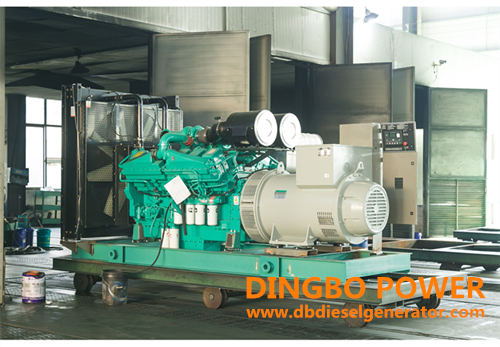dingbo@dieselgeneratortech.com
+86 134 8102 4441

- Home
- Products
- About Us
- Service
- News
- Technical Support
- Contact Us
dingbo@dieselgeneratortech.com
+86 134 8102 4441
Mar. 12, 2022
The following sections are provided for general information. If engine oil is to perform adequately, it must perform the following functions:
The primary function of the engine oil is to lubricate moving parts of diesel engine of generator set. The oil forms a hydrodynamic film between metal surfaces. preventing metal - to - metal contact and reducing friction. When the oil film is not sufficient to prevent metal - to - metal contact, the following occurs :
1. Heat is generated through friction.
2. Local welding occurs.
3. Metal transfer results in scuffing or seizing.

Extreme Pressure Wear Control
Modern lubricants contain Extreme Pressure (EP) anti-wear additives. These additives form a chemically bonded molecular film on the metal surfaces at high pressures to prevent direct contact and wear when the load on the parts is high enough to eliminate the hydrodynamic oil film.
Cleaning
Oil acts as a cleaning agent in the engine by flushing contaminants from critical components. Sludge, varnish and oxidation buildup on the pistons, rings, valve stems, and seals will lead to severe engine damage if not controlled by the oil. Oil formulated with the optimal additives will hold these contaminants in suspension until they are removed by the oil filtration system or during the course of an oil change.
Protection
Oil provides a protective barrier, isolating non-like to prevent corrosion. Corrosion like wear in the removal of metal from engine parts. Corrosion works like a slow acting wear mechanism.
Cooling
Engines requires the cooling of internal components that the primary cooling system can not provide. The lubricating oil provides an excellent heat transfer medium. Heat is transferred to the oil through contact with various components, which is then transferred to the primary cooling system at the oil cooler.
Sealing
Oil acts as a combustion seal filling the uneven surfaces of the cylinder liner piston, valve stem and other internal engine components .
Shock damping
The oil film between contacting surfaces provides cushioning and shock damping. The damping effect is essential to highly loaded areas such as the bearings, pistons, connecting rods and the gear train.
Hydraulic action
Oil acts as a working hydraulic media within the engine. Examples of this are the use of oil to operate engine brakes and STC injector tappets.
Oil additives
Lubricating oil is formulated with additives designed to combat specific contaminants ( listed in Section 6 ) throughout its usable life. The additives used are more important to overall engine performance than the oil itself. Without additives, even the highest quality oil will not be able to satisfy engine requirements. Additives include:
1. Detergents or dispersants, which keep insoluble matter in suspension until the oil is changed. These suspended materials are not removed by the oil filtration system. Excessively long oil drain intervals result in deposit formation in the engine.
2. Inhibitors that maintain the stability of the oil, prevent acids from attacking metal surfaces and prevent rust formation when the engine is not in operation.
3. Other lubricating oil additives assist the oil in lubricating highly loaded areas of the engine ( such as valves and the injector train ) , prevent scuffing and seizing, control foaming and prevent air retention in the oil.
Engine oil must be formulated in such a manner that it does not foam as a result of the mechanical agitation process associated with its many functions. Foamed oil results in engine damage similar to oil starvation, because of insufficient oil film protection.
Quicklink
Mob.: +86 134 8102 4441
Tel.: +86 771 5805 269
Fax: +86 771 5805 259
E-mail: dingbo@dieselgeneratortech.com
WhatsApp: +86 134 8102 4441
Add.: No. 10 Kechuang Road, High tech Zone, Nanning, Guangxi, China